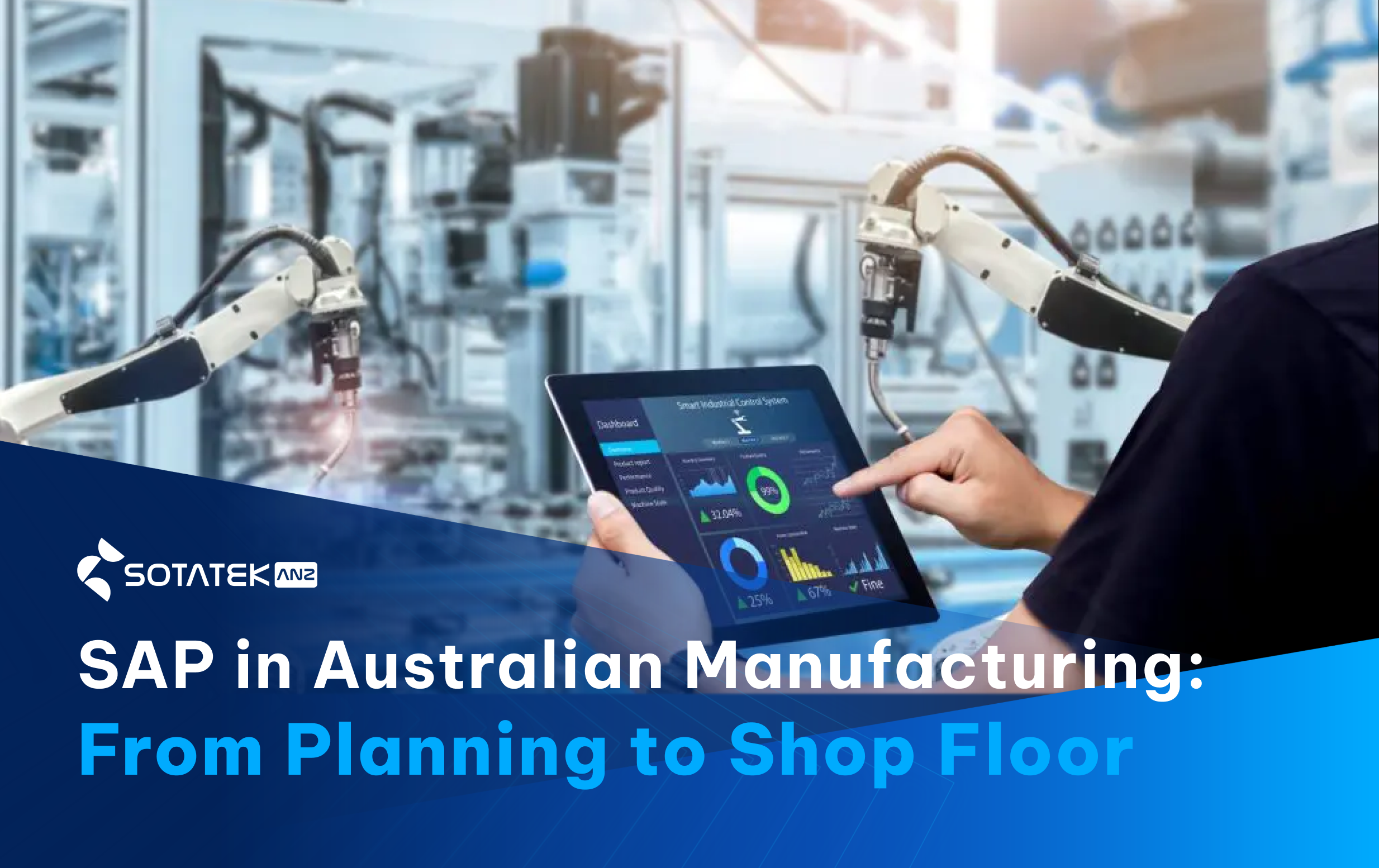Introduction
Are these the problems your manufacturing business is facing? Plans constantly shift while the shop floor struggles to keep up. Inventory fluctuates between overstock and stockouts. Quality issues, scattered data, and poor traceability make audits stressful and continuous improvement difficult. Forecasts feel unreliable, and suppliers are hard to coordinate.
If this sounds familiar, you're not alone. Many Australian manufacturers are facing the same challenges, and this is exactly where SAP in Australian manufacturing offers a smart, integrated solution.
By connecting your ERP, planning, execution, quality, and warehouse operations, SAP development enables real-time visibility and process control from demand signals to machine cycles. SAP Solutions like SAP S/4HANA, Digital Manufacturing Cloud (DMC), SAP MES, etc empower teams to work with confidence, precision, and speed.
In this article, SotaTek ANZ will explore what SAP means in the manufacturing context, the key modules that matter on the factory floor, the benefits you can expect, and a roadmap to help you transition from fragmented systems to unified performance.
What is SAP in Australian Manufacturing?
SAP in Australian manufacturing is an integrated software system designed to connect and streamline core business functions across the manufacturing lifecycle. Instead of managing operations through separate tools or manual processes, SAP brings together planning, production, supply chain, quality, inventory, and finance into one unified platform.
This centralised system ensures that data flows seamlessly between departments, enabling better coordination and real-time visibility. For manufacturers in Australia, SAP acts as the digital backbone that supports both high-level planning and day-to-day shop-floor execution, laying the foundation for greater control, agility, and standardisation across operations.
By aligning systems, people, and processes, SAP development helps manufacturers build a connected environment where decisions are based on accurate, up-to-date information.
Related: What is SAP?: 4 Key SAP Modules and Applications for ANZ Businesses
Key SAP Modules for Manufacturing Companies in Australia
Building a connected, efficient, and scalable manufacturing system requires the right digital tools. SAP offers a powerful ecosystem of modules that support end-to-end operations from planning and execution to quality control and warehouse management. Below is a closer look at the most relevant SAP modules for Australian manufacturers, including their core functions and practical benefits.

Key SAP Modules for Manufacturing Companies in Australia
SAP S/4HANA (Enterprise Core)
What it does:
SAP S/4HANA is the central ERP system that integrates all major business functions—finance, procurement, production, inventory, sales, and logistics—into a single real-time platform. It replaces legacy systems, simplifies business architecture, and provides consistent, accurate data across the enterprise. Its in-memory database enables high-speed processing and real-time reporting for faster, data-driven decisions.
Key benefits:
- Unifies all departments with one source of truth
- Improves process speed and accuracy
- Enables real-time analytics and insights for decision-making
- Provides a flexible digital foundation for future growth
SAP S/4HANA Manufacturing
What it does:
This module extends the ERP system to handle detailed production processes such as bill of materials (BOM), routings, capacity planning, and production execution. It allows manufacturers to plan, monitor, and control production activities while ensuring integration with finance, quality, and logistics.
Key benefits:
- Enhances visibility into production operations
- Improves scheduling accuracy and resource utilization
- Supports make-to-stock, make-to-order, and engineer-to-order strategies
- Reduces delays and improves on-time delivery performance
SAP Digital Manufacturing (SAP DMC)
What it does:
SAP DMC is a cloud-based MES that connects shop-floor equipment, operators, and systems. It manages real-time production execution, monitors KPIs like OEE and cycle time, and provides dashboards for plant managers. It supports multi-site operations and can scale quickly across factories.
Key benefits:
- Delivers real-time visibility into shop-floor performance
- Enables data-driven decisions and faster response to issues
- Standardizes operations across multiple production sites
- Supports Industry 4.0 and smart manufacturing initiatives
SAP Manufacturing Execution (SAP MES)
What it does:
SAP MES is an on-premise MES solution focused on detailed shop-floor control. It orchestrates manufacturing steps, captures machine/operator data, ensures traceability, and enforces compliance. It is ideal for environments where strict control and data residency are required.
Key benefits:
- Provides granular control over production processes
- Ensures product traceability and regulatory compliance
- Reduces production errors and improves process discipline
- Enhances integration between planning and execution
SAP Integrated Business Planning (SAP IBP)
What it does:
SAP IBP is a cloud-based solution that supports demand forecasting, inventory optimization, supply planning, and S&OP. It enables cross-functional collaboration, scenario planning, and proactive decision-making across the entire value chain.
Key benefits:
- Improves forecast accuracy and service levels
- Helps balance inventory and capacity across plants
- Increases agility in responding to demand and supply changes
- Reduces excess stock and working capital
SAP PP (Production Planning)
What it does:
SAP PP manages material requirements planning (MRP), production order creation, routing, and scheduling. It ensures raw materials, components, and labor are aligned with production needs and delivery commitments.
Key benefits:
- Enables accurate production planning and order fulfilment
- Minimizes downtime and overproduction
- Improves coordination between procurement, planning, and production teams
- Supports adaptive scheduling in dynamic environments
SAP QM (Quality Management)
What it does:
SAP QM integrates quality checks across the product lifecycle—from supplier material inspection to in-process and final product verification. It includes tools for defect recording, quality notifications, and corrective action management.
Key benefits:
- Embeds quality into procurement and production workflows
- Reduces rework, scrap, and warranty claims
- Supports compliance with industry standards (e.g., ISO, HACCP)
- Provides end-to-end traceability for audits and certifications
SAP SCM (Supply Chain Management)
What it does:
SAP SCM coordinates sourcing, production, inventory, and transportation across the supply chain. It links customer demand with supplier capabilities to ensure timely delivery and efficient use of resources.
Key benefits:
- Improves supply chain visibility and responsiveness
- Enhances coordination across procurement, logistics, and production
- Supports vendor collaboration and proactive risk management
- Helps lower lead times and inventory costs
SAP EWM (Extended Warehouse Management)
What it does:
SAP EWM optimizes inbound and outbound logistics, warehouse resource management, inventory control, and material staging. It handles complex warehouse processes and integrates tightly with production for just-in-time material availability.
Key benefits:
- Increases warehouse efficiency and accuracy
- Enhances visibility into stock levels and locations
- Supports automation and barcode scanning workflows
- Reduces picking errors and improves order fulfilment speed
Benefits of SAP in Australian Manufacturing

How can SAP help with manufacturing?
For manufacturers in Australia, operating in a competitive, compliance-heavy, and rapidly changing environment, SAP offers more than just a system upgrade. It delivers a strategic advantage. Below are six key benefits of adopting SAP solutions tailored to the manufacturing industry:
Full Integration from Planning to Execution
SAP connects every part of your manufacturing business, including sales, procurement, production, inventory, quality, and finance, within a single, unified platform. This eliminates siloed processes and duplicate data, allowing teams to collaborate in real time with accurate, shared information. When demand shifts or supply chain issues arise, adjustments flow seamlessly across departments without manual intervention.
Improved Decision-Making with Real-Time Data
With SAP, data is processed and updated in real time, giving managers full visibility into operations at every level. Whether you're tracking OEE on the shop floor or adjusting production schedules to meet new orders, SAP’s built-in analytics empower faster, better-informed decisions that directly impact performance and cost control.
Enhanced Traceability and Quality Control
SAP integrates quality management into every stage of the product lifecycle. From raw material inspection to in-process checks and final product release, all quality-related data is captured, traceable, and auditable. This reduces rework and ensures compliance with industry standards, particularly vital for Australian manufacturers in food, pharmaceuticals, and other regulated sectors.
Efficient Inventory and Warehouse Management
SAP ensures that materials are available when and where they’re needed—without tying up excess capital in stock. Through real-time inventory tracking and advanced warehouse workflows, manufacturers can optimize storage, reduce waste, and speed up fulfillment. Integration with production ensures smooth material staging and consumption during manufacturing.
Scalable Architecture for Business Growth
Whether you're operating one factory or scaling across multiple sites, SAP supports growth without disrupting operations. You can start with core ERP functionalities and expand into advanced modules like Digital Manufacturing, IBP, or EWM as your needs evolve—ensuring long-term value without costly reimplementation.
Global Standards, Local Adaptation
SAP offers internationally recognised best practices while allowing for local customisation. Australian manufacturers benefit from global process standards while still meeting local tax, compliance, and industry-specific requirements. This balance of structure and flexibility makes SAP ideal for companies with local operations and global ambitions.
Read more: How are SAP Trends Reshaping Businesses in Australia and New Zealand?
SAP Implementation Roadmap for Australian Manufacturing
|
Phase |
Objective |
Key Actions |
|
1. Discovery & Strategy |
Identify business challenges and define the transformation goals |
- Conduct a full audit of existing systems and workflows - Map pain points to process gaps (e.g., delays, data silos, rework) - Define KPIs for success (OEE, lead time, forecast accuracy, etc.) - Align leadership and set the strategic scope |
|
2. ERP Foundation (Clean Core) |
Build a stable and scalable digital core |
- Implement SAP ERP with best practices for manufacturing and finance - Standardise master data and streamline key processes - Establish a clean core for easy upgrades and integration - Train core users and stabilise system usage |
|
3. Shop-Floor Digitisation |
Connect planning with execution for real-time control |
- Deploy digital work instructions and production data capture - Monitor OEE, cycle times, and resource utilisation live - Integrate machines, operators, and sensors into one execution layer - Enable traceability and compliance workflows |
|
4. Supply Chain & Warehouse Integration |
Optimise inventory, material movement, and staging |
- Digitise inbound/outbound logistics and warehouse operations - Sync production orders with real-time stock levels - Improve picking, packing, and just-in-time staging - Enhance visibility into material consumption and finished goods flow |
|
5. Advanced Planning & Continuous Optimisation |
Achieve enterprise-wide alignment and agility |
- Roll out predictive planning and scenario simulations - Balance demand, supply, and capacity in real time - Automate alerts and planning exceptions to reduce firefighting - Monitor long-term performance and scale across sites |
Why choose SotaTek ANZ for SAP in Manufacturing?
Selecting the right SAP implementation partner can determine how effectively your manufacturing systems perform and scale—not just at go-live, but over the long term. At SotaTek ANZ, we combine deep technical expertise with real-world industry experience to turn SAP into a platform that delivers measurable improvements in productivity, efficiency, and end-to-end visibility.
Deep Expertise in SAP Technologies
SotaTek ANZ brings strong capabilities across the SAP ecosystem including S/4HANA, Manufacturing Execution (MES), Digital Manufacturing Cloud (DMC), SAP BTP, and advanced manufacturing analytics.
Our consultants understand how to design SAP environments that reflect actual plant operations from production routings and quality flows to warehouse and supply chain dynamics. Each module is configured to work seamlessly with others, allowing Australian manufacturers to run their operations on a stable, scalable digital core.
Proven Track Record in Smart Factory and Automation Projects
We specialise in bridging the gap between SAP systems and operational technology (OT). Whether integrating IoT devices, shop-floor sensors, PLCs, or machine-level automation systems, we ensure a secure, real-time flow of production data into SAP.
This integration not only enables better decision-making but also reduces downtime, automates reporting, and lays the foundation for Industry 4.0 transformation without compromising system performance or data integrity.
Certified Delivery Teams with Global Experience
With over 1,000 engineers across Australia, Asia, and Europe, SotaTek ANZ delivers SAP manufacturing projects at both local and global scale.
Whether you're launching a single-site proof of concept or rolling out SAP across multiple plants, our teams provide multilingual support, on-site and remote collaboration, and flexible delivery models to match your needs.
End-to-End Implementation and Ongoing Support
SotaTek ANZ doesn’t just hand off the system. We stay with you from day one through to long-term success. Our services cover the full lifecycle:
- Business process consulting
- System design and blueprinting
- Module configuration and integration
- Training and go-live support
- Post-implementation optimization and managed services
This end-to-end continuity means fewer handoffs, better system stability, and faster adaptation as your business evolves.
Built for Australian Manufacturing
We understand the specific needs of manufacturers in Australia, from compliance and local tax requirements to regional sourcing strategies and supply chain constraints. Our SAP solutions are built to meet Australian standards while remaining aligned with global SAP best practices.
Conclusion
In an increasingly complex and competitive manufacturing landscape, Australian companies need more than isolated tools or temporary fixes. They need a unified, intelligent system that connects every part of their operations. SAP in Australian manufacturing offers exactly that: a scalable, end-to-end platform that links planning, execution, quality, and logistics in real time. When implemented strategically, SAP becomes not just a system upgrade, but a catalyst for operational excellence, agility, and long-term growth.
Talk to SotaTek ANZ today to explore how we can help you plan, implement, and optimize SAP for your manufacturing business!







